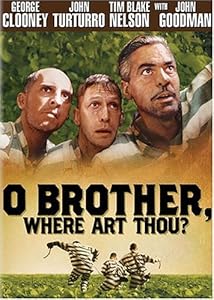 Cover of O Brother, Where Art Thou?
Cover of O Brother, Where Art Thou?
‘O Brother’ is here, in anniversary reissue
Soundtrack has an intriguing odyssey
In 2001, a score of country and bluegrass artists warbling old-timey tunes stunned the music industry by beating Bob Dylan and U2 for the best-album Grammy. A fluke? Hardly. O Brother, Where Art Thou?, among the 10 best-selling soundtracks ever, sold 7.6 million copies despite little radio support, boosted profiles of its veterans (Ralph Stanley) and contemporaries (Chris Thomas King) and breathed life into the Americana genre. A decade later, it’s getting the royal reissue treatment with a 10th anniversary deluxe edition. (click below to read more)
A second disc of 14 tracks, 12 previously
unreleased, includes the Kos-soy Sisters’ I’ll Fly Away and the Cox Family’s In the Highways.
Producer T Bone Burnett recalls
the ease of convening a wide cast
that included Alison Krauss, John Hartford, James Carter, Dan Tyminski,
Gillian Welch and The Whites.
“That community came together with absolute generosity,” he says,
hinting at a Brother-lode of material yet to surface. “Those cats play all the time, and
we never stopped recording.”
A big lure: Joel and Ethan Coen,
directors of the Homer-inspired film set in Depression-era Mississippi.
“All musicians have The Big Lebowski on the tour bus,” Burnett says.
Burnett saw an opportunity to broaden the appeal of roots music.
“Here’s all this incredible music
that hasn’t been heard in a long time,” he says. “And suddenly you had a
George Clooney movie to shine a light on it.”
Among O Brother’s distinctions:
emotional resonance, skilled players
and “it connected with levels of heritage that people probably look for
in music and don’t always get,” says Phil Gallo, Billboard senior
correspondent/film and TV music.
While the reissue’s second disc
doesn’t rise to the level of the original, “it expands that palette,”
Gallo says. Vintage banjo jigs may not have supplanted dance grooves,
but the soundtrack “really launched T Bone as a producer who pays
attention to the integrity of the music.”
O Brother didn’t upend the pop
world, Burnett says, “but it was part of a stream that has turned into
the Black Keys, White Stripes, Mumford & Sons, the Avett Brothers
and Adele, a whole range of wonderful music.”
Younger acts tapping into roots
music have an advantage, he says. “Finding a Skip James record used to
be like finding a piece of a comet. Now you have access immediately.”

No comments:
Post a Comment